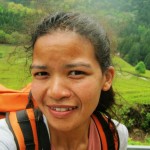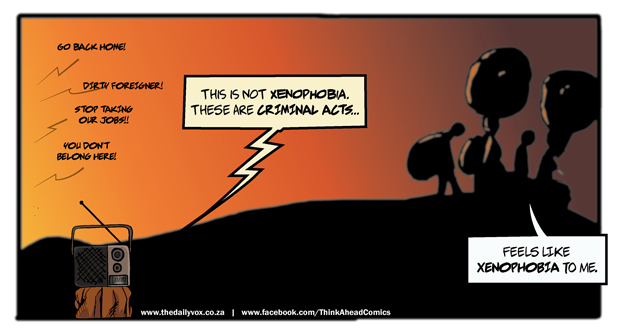SA’s particular brand of denialism in the face of obvious xenophobia keeps the rest of Africa out and stops us from challenging what is plain to see, argues LORHREN-ROSE JOSEPH.
I spent most of New Year’s day wondering what brain tissue on the cement trail in Newtown would look like in daylight. Would whoever passed by even notice the soft chunks of cerebral matter? Johannesburg has a way of making things blend into the surroundings. Would people wonder who the splattered brain had belonged to? Would they regard him or her as one of their own?
A few hours earlier, amid New Year’s celebrations, I heard an “Askies sisiâ€, followed a gentle tap on my shoulder. I turned to see who it was. My eyes greeted a stretched-out arm, his hand clasping a brick, aiming, with violent precision, straight at my head. I froze in shock, anticipating the worst. He swung.
In the the following seconds, as I thought over the situation, the irrationality of his act seemed confirmed. “Why would you do this, when you just called me sister?†I thought.
Some voices, like the SACP and a number of government officials for years (in 2015 Gauteng premier David Makhura; in 2010 then police Minister Nathi Mthetwa) have seemed intent on simply dismissing his and many other citizens’ acts as merely “criminalâ€. But from my experience in the early hours of January 1st, I recognised it was rooted in the very thing that has made us wear that “Proudly South African†tag post ’94 – our national identity.
And when multiple images and reports of rampant looting and burnt-down spaza shops in Soweto surfaced three weeks later, I recognised it again.
It’s the way we’ve defined ourselves in relation to everyone else. We coddle our shortcomings in an attempt to paint our struggles as something incomparable. So, here’s the proverbial blow: The Oxford Dictionary defines xenophobia as the dislike of or prejudice against people from other countries. Or, in my case, anyone who sort of looks foreign.
And here’s another one. According to Statistic South Africa’s census report in 2012, 2.2 million foreign nationals live in this country. The same report revealed 53 African countries are represented in South Africa, including our own.
The differentiation is evident in our (by “our†I mean South African) inviting tone, followed by our paralysing repudiation – the reluctance to call these attacks what they are. Or alternatively, the states’ continual distancing from all things migration.
Siphiwe Mahori (14), a nyaope addict,was allegedly shot by a Somali shop owner after the teenager attempted robbing the shop, media reports said. This triggered a myriad display, of embarrassing footage: people running around with egg boxes, Niknaks bags and other merchandise from foreign-owned shops all over Snake Park, Zola and Embendi.
Most perpetrators will tell you that high migrant labour employment in contrast with high domestic unemployment lies at the heart of the problem. A study by the African centre of migration shows an 81% employment rate among foreign migrants compared to 65% for non-migrants. Locals have to compete especially in the unskilled and semi-skilled sectors.
But are we not the accepting, reconciliatory Rainbow Nation? Well, clearly not! So can we just stop with that already?
For years our national identity has failed to transform into something that reaches beyond the Apartheid experience. This, and this alone makes us “exceptionalâ€. Something “those foreigners†cannot possibly relate to. So when Braai Day or any major sporting event comes around, we blow our vuvuzelas and vehemently beat our chests yelling, “We are totes awesome!â€
Let’s imagine the conversation around the fire will sound something like this: We have the biggest economy in Africa. Oh, no wait… that’s Nigeria.
“Well, our education’s pretty solid, right?’ Actually, Zimbabwe has the highest literacy rate in Africa. We’re number three on that list.
“They are plagued by famine and collapsing agriculture sectors.â€Â But according to a 2014 WWF study our food security is not in a good space either. Half of South Africa’s population doesn’t have enough food. Only 13% of land in the country is arable – that is, suitable for crop production – and most of this has only low production potential.
“But, but… power plants. Energy! … Okay I’m not playing this game, never mind.â€
The guy with the brick in his hand, didn’t hit me that night. My friend yanked my hair just in time, before any physical impact was made. As my attacker casually retreated – strolling away to join the group of men shouting profanities aimed at pointing out my “foreignness†– his impunity became personified.
I had no retorts for them.What would I have said anyway? “I too was born in this country!“ or “No, you made a mistake, the Somali was to your right.†I shouldn’t have to.
Swinging a brick at someone you find threatening, or different or “other†only helps maintain the economic order of the day. It’s a self-defeating exercise.
Xenophobic attacks, whether the killing of foreigners or robbing their stores, are a consistent hostility faced by immigrants living in our country. The Institute for Security (ISS) has monitored xenophobia stories in local media from 2013 to December 2014. Media coverage around the country amounted to eighteen reporting instances.
“They are by no means comprehensive as many cases may not be reported in the media and these issues are complex and often reported in non-xenophobic terms,†said Lizette Lancaster, a researcher at ISS.
Why are we downplaying this? Our inability to free ourselves economically will not be solved by displacing or killing Somalis and Zimbabweans. It can only happen when we free ourselves from the chains wrapped around our own fractured skulls and in the process finally become part of Africa.

– Featured image: By Nathi Ngubane.









